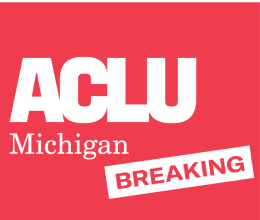UPDATE (11/06/23): On November 6, 2023, the U.S. Court of Appeals for the Sixth Circuit held that the 1970 amendment to Michigan’s Constitution, which preserves public funding for public schools, is constitutional, affirming the lower court’s dismissal of the lawsuit that sought to have it struck down. As a result, Michigan’s long tradition of prohibiting taxpayer money from being used to fund private and parochial schools will continue.
Originally published April 6, 2022
Fighting to protect public education, the ACLU of Michigan and a group of allies recently joined together in opposing a new lawsuit that seeks to divert potentially hundreds of millions of tax dollars to private schools.
At stake is the health of our state’s public education system – and with it, the health of our democracy.
On the surface, the case might not seem all that significant because the plaintiffs purport to be asking for something modest: the ability to pay for private-school tuition using money from education savings accounts known as “529 plans.” People can take a tax deduction when they invest in the accounts, with the money growing tax-free.
Partly because of a state constitutional amendment approved in 1970 by voters seeking to protect our public school system, Michiganders can’t use 529 plans to pay for private k-12 schooling. The lawsuit, Hile v. Michigan, seeks to change that.
But it’s not the technical, tax-focused aspects of the case that make it so significant. We joined in opposing this lawsuit because it seeks to have the entire 1970 amendment struck down.
Such a decision would go against both well-established legal precedent and a majority of Michiganders’ repeatedly expressed desire to keep taxpayer dollars dedicated to public schools, not private schools.
The 1970 amendment is clear:
“No public monies or property shall be appropriated or paid or any public credit utilized, by the legislature or any other political subdivision or agency of the state directly or indirectly to aid or maintain any private, denominational or other nonpublic, pre-elementary, elementary, or secondary school.” The amendment goes on to specify that no “tax benefit, exemption or deductions, tuition voucher, subsidy, grant or loan of public monies or property” may be provided by the state for such schools.
Strong majorities reaffirmed their support for this principle at the polls in 1978 and again in 2000.
In addition to enjoying strong public support, there are a number of other reasons to keep this important guarantee etched in our state constitution.
Protecting Diversity and Inclusion
When taxpayer dollars are used to support private schools, we are publicly funding everything they do. That can cause real problems. Unlike public schools, private schools can pick and choose their students – opening the door to the potential for discrimination. In fact, attempts to divert public funds to private schools have roots in the so-called “voucher” systems devised to sidestep court-ordered public-school desegregation. As the National Education Association points out on its website:
“The historical origins of vouchers come out of a Virginia county shutting down its public schools and opening white academies to avoid adhering to Brown v. Board of Education. It should escape no one’s attention that vouchers all too frequently have been used to further segregation and promote discrimination.”
Private schools, unlike public schools, can also make curriculum choices without facing public accountability. If narrow or distorted perspectives on civics, history, culture, and even science are being taught in a private school, there is nothing that taxpayers can do about it. But the public at large should not be compelled to pay for the teaching of narrow views.
One of the great benefits provided by an effective public school system is to bring diverse people together to learn about the world and each other. But when taxpayers are required to fund private education, public money can be used to separate and divide us.
Lacking Merit
Intent on defending the 1970 amendment, the ACLU of Michigan and a host of allies recently filed an amicus curiae brief, also known as a friend of the court brief, in the case earlier this year.
Our message to the court was clear: the suit is without merit and should be dismissed. Although there are many reasons for that, our brief focused on three key factors:
- Michigan’s current policy is fully supported by long-established United States Supreme Court precedent. The law is clearly on our side.
- The plaintiffs incorrectly contend that the 1970 constitutional amendment discriminates against religious schooling. It doesn’t. In Michigan, religious schools are treated exactly the same way as all other private schools.
- We also contest the argument that the 1970 constitutional amendment was motivated by anti-religious prejudice. Michiganders overwhelmingly supported the amendment because they wanted limited taxpayer funds to be used to strengthen their public schools and ensure a better future for all children.
Democracy Rooted in Public Education
The idea that a healthy democracy requires well-funded, broadly inclusive public schools dates to our nation’s founding.
Among those pursuing the then-revolutionary idea of using tax dollars to fund the education of “every rank and class of people” was John Adams. He and other early-American leaders emerging from the age of enlightenment clearly saw the need for a well-educated public able to make informed, reasoned decisions when casting their votes and voicing opinions regarding public policies.
Education’s role as a cornerstone of democracy has also been repeatedly affirmed by our nation’s courts. To cite one particularly noteworthy example, there’s the unanimous opinion issued in Brown v. Board of Education, the landmark 1954 Supreme Court case that outlawed segregation in public schools:
“Today, education is perhaps the most important function of state and local governments. Compulsory school attendance laws and the great expenditures for education both demonstrate our recognition of the importance of education to our democratic society,” wrote Chief Justice Earl Warren. “It is the very foundation of good citizenship.”
That still holds true.
A good public education is the great equalizer of our democracy: rich or poor, black or white, gay or straight, people who have disabilities and those who don’t – everyone has the right to a free, inclusive, high-quality, public education.
To be sure, people also have a right to provide their children with a private school or religious-based education if they choose. But they don’t have a right to public subsidies to fund those alternatives.
Battles on All Fronts
The lawsuit we’re fighting isn’t an isolated threat. Instead, it is just one tactic in a well-funded effort to challenge our state’s constitutional commitment to public schools on multiple fronts.
In addition to the court battle, proponents of using tax money to fund private schools late last year passed bills in both houses of the Michigan Legislature that would have allowed individuals to receive tax write-offs for donations to scholarship programs directed toward private school students.
Gov. Gretchen Whitmer vetoed those measures, but now a statewide campaign has been launched to enact them into law anyway. If enough signatures are collected, the Legislature could vote the measure into law with no veto possible – taking the issue out of the hands of voters, a majority of whom have staunchly opposed using public money for private schools in past elections.
The budget hit these tax credit schemes could inflict is significant. When Gov. Whitmer vetoed the tax write-off legislation, she cited “projections the program could cost the state $500 million in 2022 alone…”
Even larger would be the cost to public education if these efforts gain traction, opening the door to a voucher-type system that allows for the massive public funding of our state’s private schools. That has been the ultimate longtime goal for the interest groups and wealthy donors funding these efforts, beginning in the 1990s and continuing through today.
So far, the Michigan Constitution, and legal efforts like ours, have kept that door shut. We have engaged in this fight because it is one Michigan’s public school system – and the democracy it supports – can’t afford to lose.



